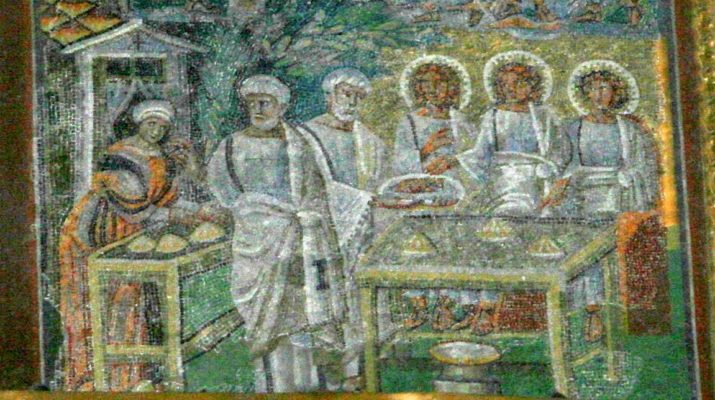2 Corinthians 13:11-13
Trinity Sunday A
11 Finally, brothersA and sisters, farewell.B Put things in order,C
A “brothers” = adelphos. From a (with, community, fellowship) + delphus (womb). This is a brother in a literal or figurative sense. It is also used of another member of the Church.
B “farewell” = chairo. From char– (to extend favor, lean towards, be inclined to be favorable towards). This is to rejoice, be glad or cheerful; a greeting. This is the root verb that the Greek word for “grace” comes from (charis).
C “put things in order” = katartizo.13x in NT. From kata (down, against, throughout, among) + artizo (get ready, prepare); {from artios (perfect, complete, ready, adequate, fitted); from arti (now, in the moment); from airo (raise, take up, lift, remove)}. This is to prepare, complete, perfect for final use. This is restoring something to a good condition, whether for the first time or one more. It is to repair in a literal or figurative sense.
listen to my appeal,D agree with one another,E live in peace;F
D “listen to my appeal” = parakaleo. From para (beside, by, in the presence of) + kaleo (to call by name, invite, to name, bid, summon, call aloud) {related to keleuo (to command, order, direct); from kelomai (to urge on)}. This is to call to, summon, invite, request, or beg. It can also be exhort or admonish. Also, this can be encourage, comfort, or console. This word has legal overtones and is used of one’s advocate in a courtroom. It is the root of the name of the Holy Spirit “paraclete” is our advocate and comforter.
E “agree with one another” = ho + autos + phroneo. Literally “the same mind.” Phroneo is from phren (diaphragm, heart, intellect, understanding; figurative for personal opinion or inner mindset; thought regulating action; sympathy, feelings, cognition); perhaps from phrao (to rein in or curb). This is to think, judge, use one’s mind, have an opinion, shape one’s opinion through action. It refers to one’s insight or inner perspective expressing itself through behavior.
F “live in peace” = eireneuo. 4x in NT. From eirene (one, peace, quietness, rest, peace of mind, harmony; a common farewell among Jews (i.e. shalom) as a well-wishing that included a blessing of health and wholeness for the individual; indicates when everything that is essential is joined together properly; peace literally or figuratively; by implication, it is prosperity –not in the sense of excessive wealth, but having enough from day to day); perhaps from eiro (to join, tie together to form a whole). This is to live in peace, be peaceful, have peace, to have integrity and wholeness.
and the GodG of loveH and peaceI will be with you.
12 GreetJ one another with a holyK kiss.L All the saintsM greet you.
J “greet” = aspazomai. Perhaps from a (with, together with) + a form of spao (to draw, draw out, pull). This is to welcome, salute, or greet. It can also be to embrace or acclaim.
K “holy” = hagios. From hagnos (holy, sacred, pure ethically, ritually, or ceremonially; prepared for worship, chaste, unadulterated, pure to the core; undefiled by sin; figurative for innocent, modest, perfect). God is totally different from humanity and thus set apart. That which is consecrated to worship God (elements of worship) or to serve God (as the saints) are holy because they are now set apart for God’s purposes. Holy because important to God. This is sacred physically, pure. It can be morally blameless or ceremonially consecrated.
L “kiss” = philema. 7x in NT. From phileo (friendship love and fondness with personal attachment; kiss as a sign of love deriving from this personal affection -cherishing); {from philos (dear, beloved, a friend, an associate; friendship with personal affection, a trusted confidante; love from personal experience with another person)}. This is a kiss of friendship or other deep bond.
M “saints” = hagios. Same as “holy” in v12. See note K above.
13 The graceN of the LordO JesusP Christ,Q
N “grace” = charis. Related to “farewell” in v11. Perhaps from chairo (see note B above). This is grace, kindness, favor, gratitude, thanks. It is the sense of being inclined to or favorable towards – leaning towards someone to share some good or benefit. This can be literal, figurative, or spiritual. It is grace as abstract concept, manner, or action.
O “Lord” = kurios. From kuros (authority, supremacy). This is a respectful address meaning master or sir. It refers to one who has control or power greater than one’s own. So, it was also applied to God and Jesus as Master or Lord.
P “Jesus” = iesous. From Hebrew Yehoshua (Joshua, the Lord is salvation); {from YHVH (proper name of the God of Israel; the self-existent and eternal one); {from havah (to become) or from hayah (to come to pass, become, be)} + yasha (to deliver, defend, help, preserve, rescue; properly, to be open, wide or free, which implies being safe. So, in a causative sense, this is to free someone). This is Jesus or Joshua in Greek – the Lord saves or the Lord is salvation.
Q “Christ” = christos. From chrio (consecrate by anointing with oil; often done for prophets, priests, or kings). Literally, the anointed one, Christ. The Greek word for Messiah.
the love of God, and the communionR of the Holy SpiritS be with all of you.T
R “communion” = koinonia. 19x in NT. From koinonos (partner, companion, partaker, sharer); From koinos (common, shared, unclean, ritually profane); probably from sun (with, together with). This is sharing in common so it is fellowship, participation, communion, and aid that comes from the community.
S “Spirit” = pneuma. From pneo (to blow, breath, breathe hard). This is wind, breath, or ghost. A breeze or a blast or air, a breath. Figuratively used for a spirit, the human soul or part of us that is rational. It is also used supernaturally for angels, demons, God, and the Holy Spirit. This is where pneumonia comes from.
T {untranslated} = amen. From Hebrew amen (verily, truly, amen, truth, so be it, faithfulness); from aman (to believe, endure, fulfill, confirm, support, be faithful, put one’s trust in, be steadfast. Figuratively, this is to be firm, steadfast, or faithful, trusting, believing, being permanent, morally solid). This word is literally firmness, but figuratively fidelity, faithfulness, honesty, responsibility, trust, truth, steadfastness. Properly, it is to be sure, certain, or firm. This is a word of emphasis indicating that something crucial follows.
Image credit: “Abraham at Mamre” from the Santa Maria Maggiore building in Rome, AD 432.




